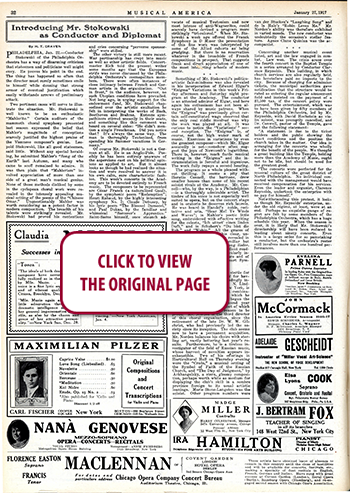 100 YEARS AGO IN MUSICAL AMERICA (183)
100 YEARS AGO IN MUSICAL AMERICA (183)
January 27, 1917
Page 32
Introducing Mr. Stokowski as Conductor and Diplomat
By H.T. CRAVEN
PHILADELPHIA, Jan. 22.-Conductor Stokowski of the Philadelphia Orchestra has a way of disarming criticism that statesmen and politicians well might envy. He proves his point in the end. The thing has happened so often that the director must surely sometimes smile to himself while donning that strong armor of eventual justification which easily withstands arrows of preliminary attack.
Two pertinent cases will serve to illustrate the situation. Mr. Stokowski is well known to be an enthusiastic “Mahlerite.” Certain auditors of the mammoth choral symphony presented last season expressed the belief that Mahler s magnitude of conceptions scarcely justified the highest praise of the Viennese composer’s genius. Leopold Stokowski, like all good statesmen, said little. Without any special heralding, he submitted Mahler’s “Song of the Earth” last Autumn, and many who came to scoff remained to admire. It then plain that “Mahlerism involved appreciation of more than one side of a great man’s musical genius. None of those methods disliked by some in the cyclopean choral work were revealed in the intensely appealing musical setting of the poems of the “Chinese Omar.” Unquestionably Mahler was worth considering as a potent factor in modern composition. The breadth of his talents were strikingly revealed. Mr. · Stokowski had proved his contentions and cries concerning “perverse sponsorship” were stilled.
The other victory is still more recent. War partisanship has crept into music as well as other artistic fields. Concertmaster Rich told the present writer . . . some months ago that the European strife was never discussed by the Philadelphia Orchestra's cosmopolitan members. There were often instances of close intimacy between French and German artists in the organization. “Out in front” in the audience however no such Utopian conditions have prevailed. Not long ago, in urging support for the endowment fund, Mr. Stokowski rhapsodized over the artistic exultation he felt in interpreting the works of Bach, Beethoven and Brahms. Entente sympathizers stirred uneasily in their seats, and something like this comment was heard on several sides: “He didn't mention a single Frenchman. Did you notice that? It's always the same way. The man is thoroughly Teutonized, from spending his summer vacations in Germany.
Of course Mr. Stokowski is not a German at all. He is an Anglo-Pole. Possibly he has been entirely unaware of the aspersions cast on his political opinions as applied to art. But it almost looks as though he had realized the situation and was resolved to answer it in his own calm, sure characteristic fashion. This week’s concert in the Academy are to be devoted entirely to French music. The composers to be represented are Cesar Franck (a naturalized Gaul) by the symphonic poem “Redemption”; Henri Rabaud, by the highly interesting symphony No. 2; Claude Debussy, by his lyric poem “The Blessed Damozel,” and Paul Dukas, by the familiar and whimsical “Sorcerer's Apprentice.” Saint-Saëns himself, once staunch advocate of musical Teutonism and now most intense of anti-Wagnerites, could scarcely have devised a program more strikingly “tri-colored.” When Mr. Stokowski a week ago offered the Franck Symphony in D Minor the presentation of this fine work was interpreted by some of the Allied cohorts as· being grudging. But there is no reservation whatever in the broadside of French compositions in prospect. That suggests frank and direct appreciation of one of the most interesting schools of modern music.
* * *
Something of Mr. Stokowski’s politico-artistic fair-mindness was also revealed in his incorporation of Edward Elgar’s “Enigma” Variations in this week’s Friday afternoon and Saturday night program at the Academy. The conductor is an attested admirer of Elgar, and here again his enthusiasm has not been always shared by music patrons. When the “Enigma” was previously given certain self-constituted wags observed that the only real riddle involved was why the work was played at all. It was curious to notice the “Variations” second reception. The “Enigma” is, of course, not the high water mark of music. Exercises in variations by even the greatest composer—which Mr. Elgar assuredly is not—somehow often suggest the joys of Newcomb’s logarithms. There is, however, much facile musical writing in the “Enigma” and the instrumentation is forceful and ingenious. The work fully repays a second hearing.
The program as a whole pleased without thrilling. It seems a pity that Horatio Connell, the baritone, drew smaller houses than some of his recent soloist rivals at the Academy. Mr. Connell—who, by the way, is a Philadelphian—is a thoroughly admirable artist. The timbre of his voice is not especially well suited to opera, but on the concert stage and in oratorio he deserves rich laurels. He was heard in Handel’s noble, recitative and aria, “Hear Me! Ye Winds and Waves”; in Mahler's poetic little song, embroidered with effective writing for the celesta, “Ich atmet’ einen linden Duft,” and in Schubert’s “Du bist die Ruh,” and “Wohin.” All the graces of his refined, careful art, his clear, unforced tones, were delectably revealed in this last named number—familiar but never· hackneyed, a pearl among lieder. The orchestra alone gave excellent readings of Beethoven’s not particularly interesting “Prometheus” overture and of the ever welcome, sunny Mozart Symphony in G Minor.
* * *




 RENT A PHOTO
RENT A PHOTO





